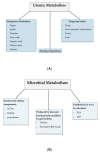Microbial-Derived Tryptophan Catabolites, Kidney Disease and Gut Inflammation
- PMID: 36136583
- PMCID: PMC9505404
- DOI: 10.3390/toxins14090645
Microbial-Derived Tryptophan Catabolites, Kidney Disease and Gut Inflammation
Abstract
Uremic metabolites, molecules either produced by the host or from the microbiota population existing in the gastrointestinal tract that gets excreted by the kidneys into urine, have significant effects on both health and disease. Tryptophan-derived catabolites are an important group of bacteria-produced metabolites with an extensive contribution to intestinal health and, eventually, chronic kidney disease (CKD) progression. The end-metabolite, indoxyl sulfate, is a key contributor to the exacerbation of CKD via the induction of an inflammatory state and oxidative stress affecting various organ systems. Contrastingly, other tryptophan catabolites positively contribute to maintaining intestinal homeostasis and preventing intestinal inflammation-activities signaled through nuclear receptors in particular-the aryl hydrocarbon receptor (AhR) and the pregnane X receptor (PXR). This review discusses the origins of these catabolites, their effect on organ systems, and how these can be manipulated therapeutically in the future as a strategy to treat CKD progression and gut inflammation management. Furthermore, the use of biotics (prebiotics, probiotics, synbiotics) as a means to increase the presence of beneficial short-chain fatty acids (SCFAs) to achieve intestinal homeostasis is discussed.
Keywords: CKD; SCFAs; biotics; indoles; indoxyl sulfate; intestinal inflammation; tryptophan derivatives.
Conflict of interest statement
The authors declare no conflict of interest.
Figures



References
-
- Niwa T., Ise M. Indoxyl sulfate, a circulating uremic toxin, stimulates the progression of glomerular sclerosis. J. Lab. Clin. Med. 1994;124:96–104. - PubMed
Publication types
MeSH terms
Substances
Grants and funding
LinkOut - more resources
Full Text Sources
Medical

